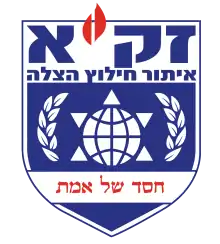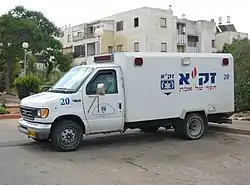| זק"א | |
 ZAKA logo | |
| Formation | 1989 |
|---|---|
| Purpose | First aid, search and rescue, Jewish burial |
| Location | |
CEO | Dubi Weissenstern |
| Website | http://www.zaka.org.il |
ZAKA (Hebrew: זק"א, abbreviation for Zihuy Korbanot Ason, זיהוי קרבנות אסון, lit. 'Disaster Victim Identification') is a series of voluntary community emergency response teams in Israel, each operating in a police district (two in the Central District due to geographic considerations). These organizations are recognized by the Israeli government. The full name is "ZAKA – Identification, Extraction and Rescue – True Kindness" (זק"א - איתור חילוץ והצלה - חסד של אמת). The two largest ZAKA factions are Zaka Tel Aviv and ZAKA Search and Rescue.
Background
ZAKA volunteers respond to the scenes of terrorist attacks and homicides throughout Israel. The volunteers are trained paramedics and are on call 24/7.[1] ZAKA collects the remains of the dead, including their blood, so that they may be buried in accordance with Jewish religious law. Volunteers are allowed to work on Shabbat, because the sabbath can be broken in matters of life and death.[2]
Members of ZAKA, most of whom are Orthodox Jews, assist ambulance crews, aid in the identification of the victims of terrorism, road accidents and other disasters, and where necessary gather body parts and spilled blood for proper Jewish burial. They also provide first aid and rescue services, and help with the search for missing persons and participate in international rescue and recovery operations.
The founders and members of ZAKA prefer to call the organization and their work Chesed shel Emet (חסד של אמת – lit. 'Kindness of truth'), because they are dedicated to ensuring that the bodies of Jewish victims are buried according to Halakha, Jewish law. After acts of terrorism, ZAKA volunteers also collect the bodies and body parts of non-Jews, including suicide bombers, for return to their families. The phrase Chesed shel Emet refers to doing "kindness" for the benefit of the deceased, which is considered to be "true kindness", because the (deceased) beneficiaries of the kindness cannot return the kindness.
History

The organization traces its roots to a group of religious volunteers who assisted in the recovery of human remains after a terrorist attack on bus line 405 in Israel in 1989, during the First Intifada. ZAKA was formally established in 1995.[2]
During the attack on bus line 405 in 1990, Yehuda Meshi Zahav arrived with other yeshiva boys to provide first aid to the victims. On his way home, he concluded that if in the enemy's view everyone is equal, so too for him. In the 1990s, he arrived at the scenes of suicide bombing attacks in Israel, among other things, and treated the bodies of those killed. As a result, ZAKA (Disaster Victim Identification) was founded. In his capacity as Chairman of ZAKA, he worked for inter-religious and secular reconciliation.[3]
In 2005, ZAKA established a minorities unit with Bedouin, Muslim, and Druze volunteers to serve Israel's non-Jewish communities, primarily Bedouin in the Negev and Druze in the Galilee. These units also function when religious Jews cannot, on the Jewish Sabbath and holidays. According to Jewish law, Jews may violate the Sabbath to save a life, but not to deal with the dead. By 2010, its minorities units had expanded to three units and approximately 125 volunteers.[1]
In 2004, a group of ZAKA volunteers flew to The Hague, with the wreckage of the bus destroyed in the Jerusalem bus 19 suicide bombing on 29 January 2004. The wreckage, along with pictures of 950 victims of terrorism, was taken to Washington, D.C. to urge the United States government to act against terrorism.[4] The bus was later displayed at various US universities.[5]
In August 2007, ZAKA members were accused of burning down a secret crematorium in Israel. Most Jews believe Jews should be buried according to religious tradition, not cremated. ZAKA's founder Yehuda Meshi Zahav denied any involvement of ZAKA in the arson but called the existence of the crematorium a "desecration of the dead" and said that the crematorium was "destined to disappear in flames."[6]
In January 2016, after two failed attempts, the United Nations granted ZAKA the status of a 'consultant NGO'.[7]
Organization
Its volunteers are almost all ultra-Orthodox Jews.[2] However as of 2010, more than 125 Muslim, Druze, and Bedouin volunteers provided services to non-Jewish victims.[1]
Currently, the Israeli government funds three ZAKA organizations demographically divided in different police districts in Israel. ZAKA Tel Aviv covers the Tel Aviv district. According to the most recent Police report ZAKA Tel Aviv responded to 550.33% more calls and had 410.20% more volunteers respond to emergencies than any other ZAKA.
In 2010, ZAKA volunteers numbered 1,500.[1]
The organization says it employs around 4,000 volunteers, though an 2022 investigation by Haaretz, based on "documents and testimonies by senior figures in the organization", said there were fewer than 1,000 volunteers, alleged that the numbers were inflated to increase funding, and found volunteers who said they had not received the biannual training mandated by the Interior Ministry.[8] ZAKA denied the report.[8] In 2017, its annual operating budget was about one million shekels.[9]
International rescue & recovery operations
In late 2004 and early 2005, members of ZAKA provided assistance in Thailand, Sri Lanka, India and Indonesia in the aftermath of the 2004 Indian Ocean earthquake. Forensic teams reportedly dubbed the group "the team that sleeps with the dead" because they toiled nearly 24 hours a day at Buddhist pagodas in Thailand that had been transformed into morgues to identify those who died in the tsunami. The experience of ZAKA members, who reportedly see 38 bodies a week on average in Israel, helped the Israeli forensic team to identify corpses faster than many of the other forensic teams that operated in Thailand in the aftermath of the disaster, which placed them in high demand with grieving families.[10]
In February 2007, ZAKA sent a 10-person search and rescue team, consisting primarily of rescue divers, to Paris to search for a missing Israeli defense official. The mission was funded by the Defense Ministry at an expected cost of $80,000.[11]
In November 2008, ZAKA volunteers went to Mumbai, India following terrorist attacks that included a Jewish center among its targets.
Following the 2010 Haiti earthquake, a six-man ZAKA International Search and Rescue Unit delegation arrived in Haiti to assist with search and recovery efforts. Working with the Mexican military delegation and Jewish volunteers from Mexico, eight students trapped under the rubble of the collapsed eight-storey Port-au-Prince University building were rescued on the first day after their arrival.[12][13][14]
Teams of ZAKA volunteers were sent to Japan in March 2011 to assist in search-and-rescue after the devastating earthquake and subsequent tsunami.[15]
A ZAKA team was part of an Israeli mission to Nepal in late April 2015 to help search for casualties in the aftermath of the earthquake and subsequent avalanches.[16]
In January 2017, a team of ZAKA volunteers participated in the response to earthquake in Port-au-Prince, Haiti.[17]
In January 2019, a ZAKA team deployed in Brazil to conduct search and rescue operations following a dam collapse in Brumadinho.[18]
Public recognition
ZAKA is known in Israel as the primary Chesed Shel Emes organization, though other such organizations exist.[19]
The increase in reputation, donations and manpower enabled ZAKA to participate in additional voluntary activities beyond disaster victim identification and supplying first aid. Such other activities include helping senior citizens and education initiatives to prevent road accidents.
Casualties and injuries
Several ZAKA volunteers died as a result of the October 7th, 2023 Hamas attack. Danny Vovk, a ZAKA volunteer driver, was killed during the Netiv HaAsara massacre.[20] Volunteer Motti Botzkin suffered a stress induced heart attack after 16 days of caring for and identifying bodies following the attack.[21]
Key people
See also
References
- 1 2 3 4 Amy Klein (21 May 2010). "ZAKA expanding Arab units". JTA. Archived from the original on 24 September 2012. Retrieved 6 July 2010.
- 1 2 3 Gunter, Joel (14 October 2023). "Zaka: The volunteers giving dignity to Israel's dead". BBC. Retrieved 20 November 2023.
- ↑ "Biography (in Hebrew)".
- ↑ "Suicide bombing of Egged bus no. 19 in Jerusalem". Israeli Ministry of Foreign Affairs. 29 January 2004. Archived from the original on 7 February 2009. Retrieved 12 October 2023.
- ↑ "Bombed Israeli Bus on Display at Duke Oct. 12-13". Duke University. 10 June 2007. Archived from the original on 10 June 2007.
- ↑ "'Arson' at Tel Aviv crematorium". BBC News. 23 August 2007. Archived from the original on 25 January 2019. Retrieved 4 January 2009.
- ↑ Ziri, Danielle (28 January 2016). "UN gives ZAKA official consultant status". The Jerusalem Post. Archived from the original on 27 September 2020. Retrieved 12 October 2023.
- 1 2 Breiner, Josh (18 December 2022). "Zaka Jerusalem Inflated Data, and Got Millions of Shekels as a Result". Haaretz. Archived from the original on 18 December 2022. Retrieved 18 December 2022.
- ↑ Zaka 2017 Financial Declaration Archived 9 January 2021 at the Wayback Machine (Hebrew), December 2017 (hosted on the official website).
- ↑ "Israelis bring skills at identifying bodies". The Sydney Morning Herald. 8 January 2005. Archived from the original on 1 March 2006. Retrieved 12 October 2023.
- ↑ Lis, Jonathan (18 February 2007). "ZAKA rescue team to search for defense official missing in France". Haaretz. Archived from the original on 29 August 2008.
- ↑ Julian, Hana Levi (14 January 2010). "One Israeli Missing in Haiti". Israel National News. Archived from the original on 12 October 2023. Retrieved 12 October 2023.
- ↑ "8 saved during "Shabbat from hell"". ISRAEL21c. Archived from the original on 19 January 2010.
- ↑ Levy, Amit (17 January 2010). "ZAKA mission to Haiti 'proudly desecrating Shabbat'". Ynetnews. Archived from the original on 9 November 2020. Retrieved 12 October 2023.
- ↑ "Israel team of volunteers to help with search and rescue efforts in Japan - Haaretz Daily Newspaper". Haaretz. 11 March 2011. Archived from the original on 13 March 2011. Retrieved 13 March 2011.
- ↑ "200 Israeli soldiers dispatched to Nepal". The Matzav Network (matzav.com). 26 April 2015. Archived from the original on 29 April 2015. Retrieved 27 April 2015.
- ↑ Levy, Amit (17 January 2010). "ZAKA mission to Haiti 'proudly desecrating Shabbat'". Ynetnews. Archived from the original on 9 November 2020. Retrieved 29 March 2019.
- ↑ "ZAKA, IDF leave on rescue mission to Brazil - Diaspora - Jerusalem Post". The Jerusalem Post. 27 January 2019. Archived from the original on 13 October 2020. Retrieved 29 March 2019.
- ↑ "שגיאה". Archived from the original on 10 June 2020. Retrieved 13 November 2011.
- ↑ "Danny Vovk, 45: ZAKA diver 'fended off 20 terrorists' before death". Times of Israel. Retrieved 30 October 2023.
- ↑ Posner, Menachem (29 October 2023). "The Painful, Painstaking Work of Israel's Burial Societies". Chabad. Retrieved 30 October 2023.
- ↑ "The Top 100 People Positively Influencing Jewish Life, 2023". Algemeiner Journal. 23 October 2023. Retrieved 9 January 2024.
- ↑ Maital, Shlomo (28 November 2019). "ZAKA's mission: Picking up the pieces". The Jerusalem Post. Retrieved 9 January 2024.
